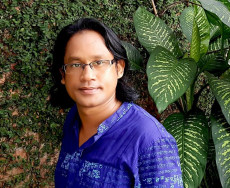Mayadip
The shadowy game of life and death
Pulls me very close;
When the dawn light childhood of the day
Darkness wraps its solitary wings
The illusion is cut down
Red scratch of fire in sleepless eyes
On the shores of this rushing Meghna river
Maya of transformation, half-truth life!
Walk along the middle of the two sighs
With a narrow path between dreams and nightmares
House of golden clouds, the world of water
And the children wake up in the morning one by one.
(Mayadip/ Shahed Kayes; September 2006)
How I came to know about this island?
I visited this island for the first time in September 2006. I went to the neighboring island named Nunertek with my friends to attend a program. After the event, I just started walking around and came to the end of that island. Then I saw another small island and crossed the river. It was really very beautiful and rich with natural beauty! I was surprised at the first sight! It was an awesome island surrounded by the Meghna river!
I came to learn that there was no name for the island. The next week I enquired at our Assistant Commissioner (AC) Land office, a Land related Govt. office in the Mainland Sonargaon. They confirmed to me that the island was not recorded.
The day I was visiting the island, I talked with the Islanders. There was no electricity, no schools, no hospitals. The islanders are full-time fishermen and part-time farmers. They fish in the Meghna river. Almost all of them are illiterate, they can neither read nor write. People are very poor. They just live hands to mouth. They do not have their own Boats and nets for fishing in the river. They work as day laborers, and work for other rich fishermen from the neighboring island ‘Nunertek’. At the end of the day, they just earn less than 2 dollars a day.
When I came back to Mainland Sonargaon in the evening the same day, I could not stop thinking about the beauty of the island and the sufferings of the people there. At night I wrote a poem based on my experience and feelings for the new island. I named the poem “Mayadip”. The meaning of the title of the poem is the land of affection. This poem was published in a national newspaper’s weekly literary journal in October 2006.
At the next meeting of our organization Subornogram Foundation, I discussed the whole thing with my team and I proposed whether we can start a school on the island. Everybody was excited and we decided to establish a school on the island. The next year we arranged a meeting with the islanders and told them about establishing a school. The islanders supported us warm-heartedly.
We started school in January 2007 on the island. I suggested a name for the school. “Mayadip Jeleshishu Pathshala.” (Mayadip School for the Fisherfolk children community) after the name of my poem ‘Mayadip’. Everybody liked the name and the school was established. The islanders helped us build the school. They worked physically to build the school and we used the local materials to build this school.
A school was born from a poem, the rest is history. After the school was started, I started calling the name of the Island “Mayadip”, then the students of our school also started calling the island ‘Mayadip’. Slowly the islanders also accepted this name. At that time I used to visit the island 4 days a week, and lived a few days at Mayadip to become more friendly with the islanders.
After 2 years one of my journalist and writer friends named Saymon Zakaria visited my home at Sonargaon in 2009, and I took him to Mayadip. He was very excited about the island after hearing things from me, then he decided to interview the islanders and write a feature on Mayadip.
The feature was published in the most popular Bengali national newspaper in Bangladesh named, “Prothom Alo”. Prothom Alo is the most widely read newspaper in my country. The title of the writing was “Mayadip-er Pathshala” (The School of Mayadip). It was published on 8 August 2009 in the supplementary journal of the newspaper named “Chhutir Dine”. It was the cover story of that issue, with 5 pages writing. After the feature was published Mayadip became very popular among the people in Sonargaon and outside of Sonargaon. and many people started visiting Mayadip. Not only the tourists, but some Govt. people also started coming to the Island.
An island is born from a poem. Then a non-privileged children’s school was born after the island’s name, popularized by the media. Then, after a couple of years, a movement started called “Save Mayadip Movement” in 2010 against the illegal sand miners involved with the real estate company to save 1200 peoples’ lives, livelihood, and environment.
To be continued…
Posted By Shahed Kayes
Posted Sep 9th, 2021

